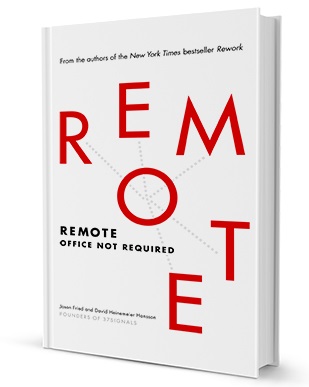Big fan of the book Rework by Jason Fried and David Heinemeier Hansson, I bought a copy of their new book Remote as soon as it reached the shelves in october 2013. Strangely enough, it's only now, after almost two years, that I finally found the time to finish it (I started reading it back then and only made the time for it this summer 2015. But to be clear, I read very few books in the 2013-2015 time frame anyway, podcasts for the win!
Remote (2013)

The style of the book is as incisive as ever. Short chapter, short sentences, no bullshit, straight to the point. The content on the other hand is at first harder to identify with. Remote work is a pretty special topic. We all have been working from home from time to time, but few (myself included) have really experienced the remote-collaborative work that this book praises.
The book is structured as follows:
- Why remote
- What to say to naysayers
- How to collaborate efficiently
- Avoid the pitfalls
- Use remote to hire the best
- Manage your remote herd
- Life as a remote worker
After reading the book, I was left with one impression only: when do I start? I loved my 40km daily biking in 2013, but if this forced commute time had been free time instead...?If you're searching for a way to start with remote work, just read it and you're covered with arguments, counter-arguments and decisive-arguments to make your point in front of your boss.
Remote Newbie
What has stuck with me on the other hand is the link between remote work and good workers. As is said in the book:
"A good remote worker is a good worker"
This is very true and I have experienced it many times in the past few months and years with my teams. People I trust to work remotely are invariably good workers. They have enough understanding of what is happening in the project or other people's mind to be able to deal with it in person or through a wire, which make them invaluable. The opposite is not true. Great team players and workers on site don't necessarily make good remote workers. The absence of "in-person" face to face communication can crush someone's way to interact and thus make him or her a bad worker when remote.
In some way, this is another example of what is happening in the Open Source Software world. When it works, OSS (way of doing things) works great. But not because of the decentralized, remote, empowering context, but because of the people it attracts. People that are able to strive in such an environment are great workers per definition. And when you gather great workers together in one project, onsite or remote, it sparks big time!
The authors use this to their advantage in their company Basecamp (formerly 37signals) by nurturing a great remote work culture and atmosphere and thus attracting the best of the best. What puzzles me though is the following: how do new workers enter this game?
In my opinion, only mutants really get the OSS way of live out of the box and are able to strive when they apply for their first job. All the others are to be taken by the hand, nurtured and lead like any apprentice. High-potential students are hard to find nowadays, let alone ones that can work remotely right off the bat.
One obvious way would be to have people collocated as long as it takes in order to learn how to work remotely and then swap back as soon as they are "enabled". Basecamp also has a bigger office in Chicago. Maybe such a central office could be used as common platform to teach the apprentices. Or maybe the millennial generation that is coming knows how to do this intuitively? I doubt so, but why not?
How would you handle this? This new-coders story interest me much. How about you? Any thoughts? Any experience working remote?

